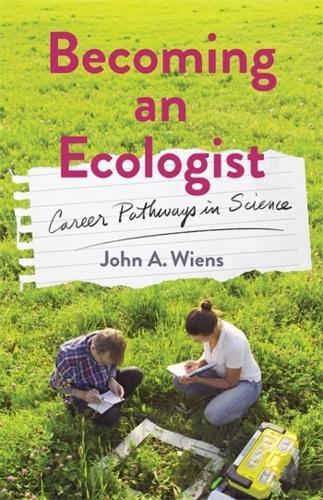Full Product Details
Author: John Wiens
Publisher: Columbia University Press
Imprint: Columbia University Press
ISBN: 9780231218047
ISBN 10: 0231218044
Pages: 280
Publication Date: 21 January 2025
Audience:
General/trade
,
General
Format: Hardback
Publisher's Status: Active
Availability: Manufactured on demand

We will order this item for you from a manufactured on demand supplier.
Reviews
This book explores what it means to be an ecologist, showing that it is a lifelong venture that can entail many pathways. Providing examples from his own journey, Wiens conveys deep knowledge about how an ecologist’s career can change over time, just as the field of ecology has developed over the years. -- Virginia H. Dale, research professor, Department of Ecology and Evolutionary Biology, University of Tennessee, Knoxville, and corporate fellow emeritus, Oak Ridge National Laboratory In Becoming an Ecologist, Wiens offers insightful reflections on why he did, or did not, take certain pathways along his distinguished scientific career. His perspectives on past debates and current issues in ecology, as well as his roles in shaping the trajectories of several disciplines, are of special significance. Becoming an Ecologist is informative, important, interesting, and vivid. The suggestions and advice Wiens provides throughout the book will be helpful to the next generations of scientists in general and ecologists in particular. -- Jianguo “Jack” Liu, Rachel Carson Chair in Sustainability, University Distinguished Professor, and director of the Center for Systems Integration and Sustainability, Michigan State University Part practical guide to the discipline, but also an ode to the wonder and beauty of the natural world and the study of it. * KLCC, NPR for Oregonians *
This book explores what it means to be an ecologist, showing that it is a lifelong venture that can entail many pathways. Providing examples from his own journey, Wiens conveys deep knowledge about how an ecologist’s career can change over time, just as the field of ecology has developed over the years. -- Virginia H. Dale, research professor, Department of Ecology and Evolutionary Biology, University of Tennessee, Knoxville, and corporate fellow emeritus, Oak Ridge National Laboratory In Becoming an Ecologist, Wiens offers insightful reflections on why he did, or did not, take certain pathways along his distinguished scientific career. His perspectives on past debates and current issues in ecology, as well as his roles in shaping the trajectories of several disciplines, are of special significance. Becoming an Ecologist is informative, important, interesting, and vivid. The suggestions and advice Wiens provides throughout the book will be helpful to the next generations of scientists in general and ecologists in particular. -- Jianguo “Jack” Liu, Rachel Carson Chair in Sustainability, University Distinguished Professor, and director of the Center for Systems Integration and Sustainability, Michigan State University
This book explores what it means to be an ecologist, showing that it is a lifelong venture that can entail many pathways. Providing examples from his own journey, Wiens conveys deep knowledge about how an ecologist’s career can change over time, just as the field of ecology has developed over the years. -- Virginia H. Dale, research professor, Department of Ecology and Evolutionary Biology, University of Tennessee, and corporate fellow emeritus, Oak Ridge National Laboratory In Becoming an Ecologist, Wiens offers insightful reflections on why he did, or did not, take certain pathways along his distinguished scientific career. His perspectives on past debates and current issues in ecology, as well as his roles in shaping the trajectories of several disciplines, are of special significance. Becoming an Ecologist is informative, important, interesting, and vivid. The suggestions and advice Wiens provides throughout the book will be helpful to the next generations of scientists in general and ecologists in particular. -- Jianguo “Jack” Liu, Rachel Carson Chair in Sustainability, University Distinguished Professor, and director of the Center for Systems Integration and Sustainability, Michigan State University
Author Information
John A. Wiens turned a childhood interest in birds into a career in ecology. He served on the faculties of Oregon State University, the University of New Mexico, and Colorado State University, where he is University Distinguished Professor Emeritus. He then worked for the Nature Conservancy as chief scientist. His work emphasizes the ecology of birds, landscape ecology, and conservation.



